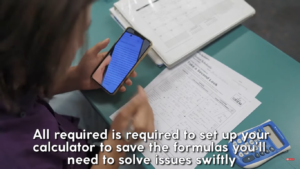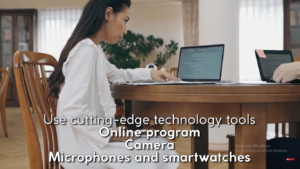How to Cheat on a Proctored Exam? Know Cheating Tips & Solutions

Academic cheating is a major problem in the educational sphere. Dr. Donald McCabe conducted a study and indicated that 95% of students have admitted to cheating in some form. They are cheating whether during homework assignments or online exams. Widespread adoption of e-learning and the fast technological development made things even worse.
While educational institutions try to implement numerous remote proctoring solutions, adjusting to the new studying reality, students use their lack of experience and uncertainty to find drawbacks and receive better grades without putting much effort and time. In this article, we will address all those sources students mostly use to cheat in exams.
What is a Proctored Exam?
A proctored exam implies that an invigilator monitors the test-takers throughout the examination process. A traditional exam is overseen by a human observer. However, the integrity of online tests can be ensured by a special AI-based proctoring software or a remote human proctor. Educators implement several proctoring techniques to provide test-takers with necessary assistance, establish a fair learning environment, ensure the safety of testing materials and prevent students from any misconduct during important assessments.
Most importantly, the process of online proctored exams is similar to that of conventional class-based tests. Students have to verify their identity and pass the authentication process before commencing the assessment. Moreover, students are asked to provide a photo or scan of their ID, enable their web cameras, and the system will cross-check details from 2 different sources. Students can proceed to the test, if their identity is successfully verified and required equipment is checked. The proctoring software will flag it, if test takers try to engage in any suspicious activity. However, it depends on the type of software, either make a report for further examination or alert the human proctor.
Online proctoring includes recording all the data regardless of detecting dishonesty in real time. If there are any disputable circumstances, it allows for the review of exam cases. There are a wide variety of features for online proctoring software. However, the common ones involve but are not limited to:
- Detection of noise
- Protection of examination content
- Blocking browser
- Verification and authentication
- Facial recognition
- Video and audio recording
Is It Possible to Cheat on a Proctored Exam?
Technologies played a key role in the adoption of online learning. They helped both academic institutions and students realise the cost-effectiveness, flexibility and scalability of remote education. On the contrary, technological developments have had several negative effects. The cutting-edge solutions and internet have enhanced the accessibility of data, thus making it easier for students to cheat.
Moreover, educators are struggling to employ new strategies and work out to maintain integrity in the digital environment. There are multiple sophisticated techniques students are using to cheat. According to Sur Tzu’s popular quote, it is necessary to ‘’know your enemy’’ to defeat them. Here, we will discuss the original methods of cheating that will help you to remove student dishonesty during online exams.
Most Clever Methods Students Use to Cheat on Online Proctored Exams & How to Prevent Them?
Impersonation:
This is usually the most common method of misconduct. In this case, students ask someone else to take an exam on their behalf. This method implies either before or in the middle of an online examination session. Before the authentication, students find ways to swap places with somebody else. For instance, they can share exam logins and change their identification documents. However, students may verify their identity themselves and thus offer a way to an impersonator. This scenario is applicable since the majority of online proctoring systems conduct verification and authentication before an exam.
If we improve the authentication mechanism and make it more elaborate and dynamic, we can prevent impersonation. Therefore, we can implement two or three factor authentication.
- Verified ID
- A scan of the authentication document and facial recognition by comparing pictures from the web camera.
- We can ask the students to insert a one-time password and send it to their previously registered mobile phone.
You can combat this curse of cheating, if you follow our instructions.
Advanced Technology and Tech Gadgets:
Modern cheaters do not try to look up the answers in course books or write formulas on their palms. Technologies and various gadgets support them to find the answers during online assessments. Screen-sharing software like Google Meet, Zoom and others help students to collaborate in real time to find the right answers and show their screen with the exam questions to helpers. Similarly, students can use their smart watches and cell phones to get information on the internet, store important information or chat with helpers in messengers. Here is how you can prevent it.
- Noise detection
- A safe exam browser
- Detection of tabs switching
- Latest audio and video proctoring
- AI data analysis
Follow our instructions to tackle this technique.
Use an External Projector:
A large number of students understand that remote proctoring software can block multiple on-screen activities. They decide to mirror their desktop screen to a projector or external display. However, a helper can see the test content and signal them the correct answers. AI-based proctoring solutions can easily detect this type of cheating. Similarly, it can deter other people in the room and spot the unusual body language of a test-taker through video recording.
Old School Tricks:
Indeed old cheating techniques are less common, but they still exist. It is important to note that they do not denote any significant threat to the integrity of online proctoring exams. However, old school tricks are not an issue for either live or automated remote proctored exams. AI-based software has the potential to detect these students and their noises. This form of dishonesty can be spotted by a live remote proctor by monitoring the audio and video feed.
Help from Friends, Family and Experts:
If students are taking exams from home, they can get help from relatives and close friends. They can see the questions and look for the answers on the internet while sitting in the same room with the examiner. Therefore, it is not difficult to combat this form of cheating using advanced proctoring techniques.
Hacking the Right Answers:
Students who are skillful in coding and programming can cheat by hacking the right answers to the multiple-choice question. However, they can run the exam in specific software that prevents the exam content as code and identifies the right answers. They consist of 0s and 1s while the rest contains coding text. If you use increased features that can detect on-screen activities, you will combat this student dishonesty.
Conclusion:
How to cheat on a proctored exam? This is the million dollar question people are curious about. If you understand some clever techniques, you will combat the curse of cheating. Moreover, management should properly verify the identity of students before taking a proctoring exam.





